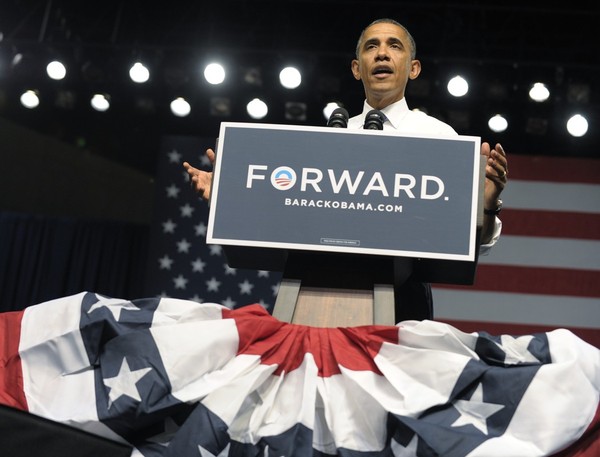In response to a series of articles in Slate that takes progressives to task, Arthur Goldberg writes correctly that it’s not progressives who have failed. It’s the Democrats.
In particular, it’s their strategy of triangulation.
Bill Clinton declared “the era of big government is over”; he signed the North American Free Trade Agreement; he gutted social welfare programs; and he led the repeal of the Glass-Steagall Act (which had negated the implicit guarantee of government bailouts).
| Triangulation may win elections, but it’s advancing few progressive principles. So the Democratic Party should take a firm stand on a single, brand-defining issue. I propose a no-brainer: taking the money out of politics. |
President Barack Obama picked up where Clinton left off.
He shepherded a massive health-care reform law depending on private insurers, an idea the conservative Heritage Foundation introduced to blunt the rising popularity of single-payer universal health care. Obama championed Race to the Top, a flawed education policy building on No Child Left Behind; and he continued many of the Bush-era counter-terrorism policies, which led to the explosive growth of the National Security Agency. His Dodd-Frank financial reform law fell far short of reinstating Glass-Steagall, and Obama lost even mild gun control legislation after the tragedy at Sandy Hook.
Why are Democratic compromises often so exceedingly one-sided? If bipartisanship were closer to fifty-fifty, I’d believe Democrats’ claim that they need to compromise with Republicans. But the typical compromise is so, um, compromised that it’s hard to believe money isn’t the real issue.
Conventional wisdom has it that money wins elections. What does it buy? Getting your message out to as many people as possible to win at least 51 percent of the vote.
But if you’re triangulating, the message gets muddled. Wouldn’t the messaging be clearer without the triangulating? Wouldn’t you spend a lot less getting your message out if you had a believable brand? Yet Democrats seem to be afraid they can’t win unless they thread the needle between voter interests and special interests. This Janus-faced neoliberal focus waters down the brand and leads to the Republican-lite image of today’s Democratic Party.
Don’t get me wrong. Democrats still present a better alternative. However, it’s hard to feel passionately about a party whose major selling point is being the lesser of two evils. Triangulation creates a party of milquetoast incrementalists afraid to lead with truly progressive plans. But I don’t want to dwell on the Republican-lite nature of today’s Democratic Party.
Instead, I want to propose a way out.
I’d like to see the Democratic Party take a firm stand on a single, brand-defining issue. The party should make this stand the defining component of its brand and find primary candidates who fully support it. While this may seem obvious, it cuts against the triangulation strategy.
What’s the best stand? Take the money out of politics.
Vast majorities believe money has corrupted our political system. In an ABC poll, 93 percent of Americans think politicians do special favors for their campaign contributors. Eighty percent think it happens “often.” A state of New York poll found that 97 percent say it’s important for state leaders to address “reducing the influence of money in politics and ending corruption” including 50 percent who say it’s extremely important. According to Gallup, half of Americans would support a completely liberal plan in which government entirely funds federal campaigns.
This issue has overwhelming support. Just don’t call it “Campaign Finance Reform.” No one cares about that because it sounds like you’re trying to fix an obscure rule governing elections. What people care about is the influence of money on government.
It’s a no-brainer.
In a New York district gerrymandered for her Republican opponent, Democrat State Senator Cecilia Tkaczyk won against the odds. She made “the public financing of elections a central issue, if not the issue, in her campaign.”
Imagine a Democratic brand of “taking the money out of politics,” not “the lesser of two evils.”
This strategy could put opponents on the defensive. In the U.S. Senate race in Ohio, the Republican candidate Josh Mandel had so much money and the race had tilted so heavily in his favor that Mandel had to defend himself against charges of outside influence.
Let’s face it, triangulating may work to win some elections, but it’s advancing few progressive principles. So why not acknowledge it and look for other strategies?
Remember a time when everyone knew where Democrats stood. Not too long ago that meant the separation of church and state, public education, gun control, equal rights, and immigration. Triangulation has helped conservatives take control of these issues by validating their positions.
I want to see the Democratic Party stand firmly for something again.
That something should begin with taking the money out of politics.
David Akadjian manages training programs for a Fortune 100 company and writes under this alias for Daily Kos. Follow him @akadjian.







0 Comments